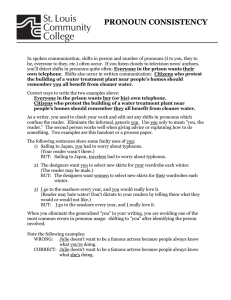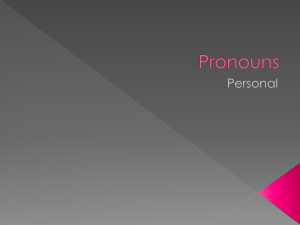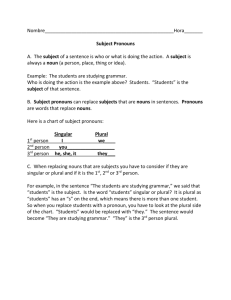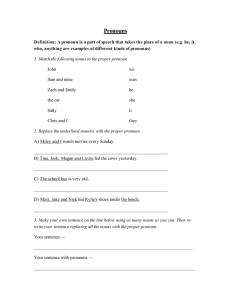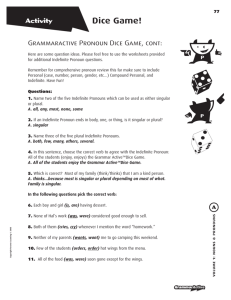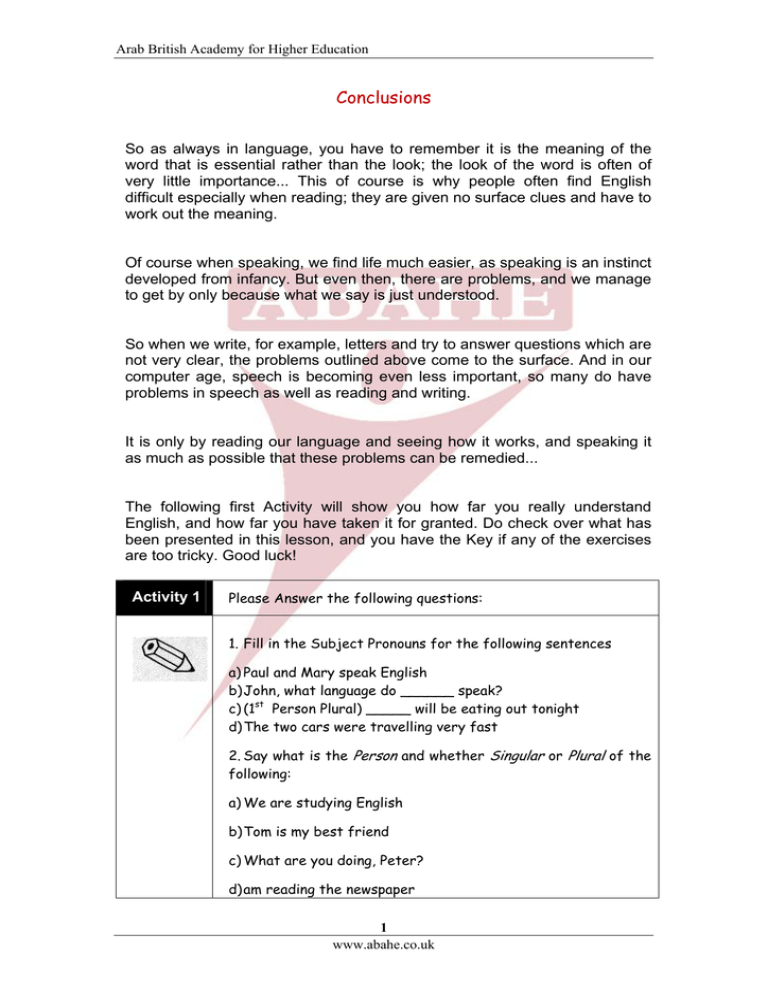
Arab British Academy for Higher Education
Conclusions
So as always in language, you have to remember it is the meaning of the
word that is essential rather than the look; the look of the word is often of
very little importance... This of course is why people often find English
difficult especially when reading; they are given no surface clues and have to
work out the meaning.
Of course when speaking, we find life much easier, as speaking is an instinct
developed from infancy. But even then, there are problems, and we manage
to get by only because what we say is just understood.
So when we write, for example, letters and try to answer questions which are
not very clear, the problems outlined above come to the surface. And in our
computer age, speech is becoming even less important, so many do have
problems in speech as well as reading and writing.
It is only by reading our language and seeing how it works, and speaking it
as much as possible that these problems can be remedied...
The following first Activity will show you how far you really understand
English, and how far you have taken it for granted. Do check over what has
been presented in this lesson, and you have the Key if any of the exercises
are too tricky. Good luck!
Activity 1
Please Answer the following questions:
1. Fill in the Subject Pronouns for the following sentences
a) Paul and Mary speak English
b) John, what language do ______ speak?
c) (1st Person Plural) _____ will be eating out tonight
d) The two cars were travelling very fast
2. Say what is the Person and whether Singular or Plural of the
following:
a) We are studying English
b) Tom is my best friend
c) What are you doing, Peter?
d) am reading the newspaper
1
www.abahe.co.uk
Arab British Academy for Higher Education
e) Paul and I are going to the cinema
f) The two boys were fishing this afternoon
For the second Activity you will be checking on how well you understand the
difference between Subject Pronouns, Direct Object Pronouns, and Indirect
Object Pronouns. Please read over this section again before trying this
Activity, and as before you have the Key after this lesson.
Identify in the following sentences whether the Pronouns are
Subject Pronouns, Direct Object Pronouns or Indirect Object
Pronouns:
Activity 2
a)
He gave me a chocolate cake.
b)
Paul and his friend will come with* us tomorrow.
c)
Do you know the way to the town?
d)
I see, you don’t know to get there.
e)
Tom and I will be going to London next week,
f)
Will Mary meet me this evening?
g)
They gave us a hard time in our last match.
h)
To* him every day is a holiday!
* See Lesson Five for Prepositions
Activit
y3
1) Replace the words in brackets in the following sentences:
a) (1st Person plural) ______ do not speak any French
b) Do (3rd plural) ______ know a good hotel in this town?
c) So (2nd plural) ________ wish to go!
d) (3rd singular) ________ is a very good girl.
2) Write out all the Persons, singular and plural, with the
meanings.
3) Identify the pronouns in the following sentences:
a)
b)
c)
He gave it to me.
They do not see how he can leave her.
The inspector asked us several questions.
2
www.abahe.co.uk
Arab British Academy for Higher Education
d)
BIG
BEN
Does she know how to give him good advice?
4) Make up Adjectives to describe The following nouns; the Key
can only suggest answers. The main thing is that your Adjective
should suit the noun it is describing:
a)
b)
c)
d)
e)
f)
g)
h)
i)
j)
A _____ mountain.
The _____ villages.
Some ______ vegetables.
Five _______ houses.
The __________horizon.
Water is ______ but ice is ________
The ______ sea
_________clouds
Summer is my favourite time, especially when it is________
London is a very ______ city.
Key
Activity One
1.
a)
b)
c)
d)
2.
a)
b)
c)
d)
e)
f)
they; it
you
we
they
1st Person Plural
3rd Person Singular
2nd Person Singular
1st Person Singular
1st Person Plural
3rd Person Plural
Activity Two
a)
b)
he = Subject Pronoun; (to) me = Indirect Pronoun
us = Object + Preposition (with) (See Lesson Five for more information)
c) you = Subject Pronoun
d) I = Subject Pronoun; you = Subject Pronoun
e) I = Subject Pronoun
f) me = Direct Object Pronoun
g) they = Subject Pronoun; (to) us = Indirect Object
Pronoun
h)
him = Object + Preposition (to) (See Lesson Five)
Activity Three
3
www.abahe.co.uk
Arab British Academy for Higher Education
1.
a) we b) they c) you d) she
1st Person Singular = I; 2nd Person Singular = you;
3rd Person Singular = he, she, it;
1st Person Plural = we; 2nd Person plural = you;
3rd Person Plural = they
2.
3.
a)
b)
he = Subject Pronoun; to me = Indirect Object Pronoun
they = Subject Pronoun; he = Subject Pronoun; her = Direct Object
c)
d)
us = Indirect Object Pronoun
she = Subject Pronoun; (to) him = Indirect Object
Pronoun
Pronoun
4.
a) A tall mountain; b) The small villages; c) Some fresh vegetables; d)
Five new houses; e) The far horizon; f) Water is cold but ice is freezing;
g) The blue sea; h) White clouds i) Summer is my favourite time,
especially when it is hot; j) London very big city
All Rights Reserved © Arab British Academy for Higher Education
4
www.abahe.co.uk


